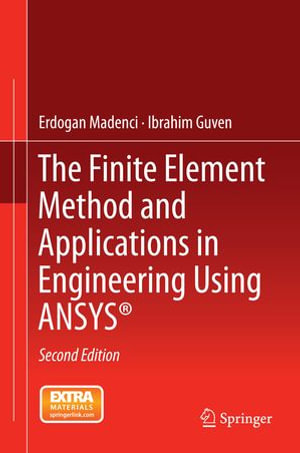
eTEXT
The Finite Element Method and Applications in Engineering Using ANSYS®
By: Erdogan Madenci, Ibrahim Guven
eText | 10 February 2015 | Edition Number 2
At a Glance
eText
$189.00
Instant online reading in your Booktopia eTextbook Library *
Read online on
Not downloadable to your eReader or an app
Why choose an eTextbook?
Instant Access *
Purchase and read your book immediately
Read Aloud
Listen and follow along as Bookshelf reads to you
Study Tools
Built-in study tools like highlights and more
* eTextbooks are not downloadable to your eReader or an app and can be accessed via web browsers only. You must be connected to the internet and have no technical issues with your device or browser that could prevent the eTextbook from operating.
This textbook offers theoretical and practical knowledge of the finite element method. The book equips readers with the skills required to analyze engineering problems using ANSYS®, a commercially available FEA program. Revised and updated, this new edition presents the most current ANSYS® commands and ANSYS® screen shots, as well as modeling steps for each example problem. This self-contained, introductory text minimizes the need for additional reference material by covering both the fundamental topics in finite element methods and advanced topics concerning modeling and analysis. It focuses on the use of ANSYS® through both the Graphics User Interface (GUI) and the ANSYS® Parametric Design Language (APDL). Extensive examples from a range of engineering disciplines are presented in a straightforward, step-by-step fashion. Key topics include:
• An introduction to FEM
• Fundamentals and analysis capabilities of ANSYS®
• Fundamentals of discretization and approximationfunctions
• Modeling techniques and mesh generation in ANSYS®
• Weighted residuals and minimum potential energy
• Development of macro files
• Linear structural analysis
• Heat transfer and moisture diffusion
• Nonlinear structural problems
• Advanced subjects such as submodeling, substructuring, interaction with external files, and modification of ANSYS®-GUI
Electronic supplementary material for using ANSYS® can be found at http://link.springer.com/book/10.1007/978-1-4899-7550-8. This convenient online feature, which includes color figures, screen shots and input files for sample problems, allows for regeneration on the reader's own computer. Students, researchers, and practitioners alike will find this an essential guide to predicting and simulating the physical behavior of complex engineering systems."
Read online on
ISBN: 9781489975508
ISBN-10: 1489975500
Published: 10th February 2015
Format: PDF
Language: English
Publisher: Springer Nature
Edition Number: 2
You Can Find This eBook In
This product is categorised by
- Non-FictionEngineering & TechnologyMechanical Engineering & MaterialsMechanical Engineering
- Non-FictionEngineering & TechnologyTechnology in GeneralEngineering in General
- Non-FictionComputing & I.T.Graphical & Digital Media Applications3D Graphics & Modelling
- Non-FictionComputing & I.T.Computer Science
- Non-FictionEngineering & TechnologyTechnology in GeneralMaths for Engineers
- Non-FictionComputing & I.T.Graphical & Digital Media ApplicationsComputer-Aided Design CAD
- Non-FictionMathematicsApplied Mathematics
- Non-FictionMathematicsCalculus & Mathematical AnalysisNumerical Analysis























